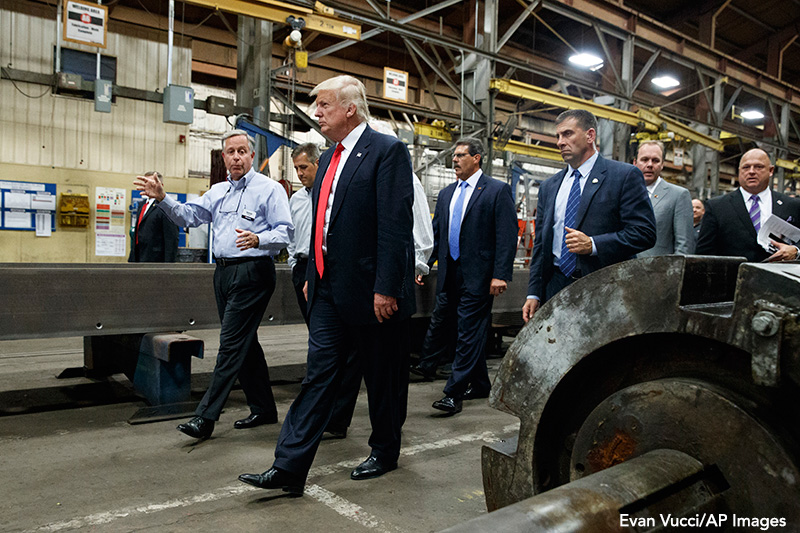Hot News
- Current Events Nebraska Rejects Winner-Take-All Proposal
- Citizenship Voting Under Age 18
- Citizenship Citizenship in Action
- Democratic Party Biden’s and Trump’s Recent Primary Results
- Elections Trump and Biden Win South Carolina and Michigan Primaries
- Democratic Party Trump and Biden Win Big in Early February Contests

Credit: AP Photo/Evan Vucci)
Republican presidential candidate Donald Trump tours McLanahan Corporation headquarters in Hollidaysburg, Pennsylvania
Talking Trade and Taxes
Earlier this month, both Donald Trump and Hillary Clinton visited Detroit, Michigan to deliver their respective economic addresses. Held at Futuramic Tool & Engineering, an automotive-turned-aerospace manufacturing company, the speeches were considered high-profile policy addresses. Aligned with the basic policies of their political parties, the candidates were in agreement on some issues and opposed on others.
Trump
- Taxes Trump has overhauled his original tax plan to be more closely aligned with traditional Republican Party stances. Trump proposes an across-the-board reduction on all income taxes (lowering the current highest tax bracket from 39.6 percent to 33 percent). He also wants to reduce the number of tax brackets from seven to three. Trump also calls for lowering the corporate tax rate, eliminating the estate (so-called “death”) tax, and allowing parents to fully deduct the average cost of childcare from their taxes.
- Infrastructure Historically, both parties want greater investment in the country’s infrastructure (highways, bridges, and systems such as sewage, water, and communications). This election cycle may be no different, except that Trump proposes spending $500 billion (nearly twice as much as Clinton). He argues that the low interest rates make it a good time for the government to borrow for this spending need.
- Trade and Manufacturing Both Donald Trump and Hillary Clinton oppose the North American Trade Agreement (NAFTA) as well as the Trans-Pacific Pacific Partnership (TPP). As part of a 7-point plan for reform, Trump vowed to withdraw the U.S. from NAFTA if it is not renegotiated. Trump also dislikes what he says is Chinese currency manipulator, and he wants to also crack down on intellectual property theft. Trump will focus on foreign competitors, whom he believes have significantly hurt American manufacturing success.
Clinton
- Taxes Clinton, a supporter of President Obama’s so-called Buffett Rule, said she would only raise taxes on the most wealthy by adding a new tax bracket (43.6%) for those who earn more than $5 million. She has vowed (as has Trump) to close loopholes that favor the wealthiest Americans from paying more taxes. On childcare, Clinton said she will expand the current Child Tax Credit and cap the cost of childcare at 10 percent of a family’s income.
- Infrastructure Like Trump, Clinton supports a considerable investment in our nation’s infrastructure. However, she proposes the idea of a “infrastructure bank.” This means that the government would provide an initial seed funding of $25 billion to finance major projects through loans and loan guarantees, and increase that to $275 billion over five years. The plan would also raise more money from private funds.
- Trade and Manufacturing Clinton has been subject to criticism for initially supporting the Trans-Pacific Partnership (see link above), but now opposing the agreement. Likewise, she initially supported NAFTA before becoming critical of it. Clinton vows to oppose any deal that hurts American jobs and American wages. In an attempt to impose tougher trade policy, Clinton supports an “exit tax” for any company that attempts to leave the U.S. tax system by merging with a smaller foreign firm, or ships jobs overseas.

![Library of Congress Prints and Photographs Division [LC-USZ62-90739]](https://mheelectioncentral.mheducation.com/wp-content/uploads/2016/08/080916_05P_IS-150x150.jpg)
